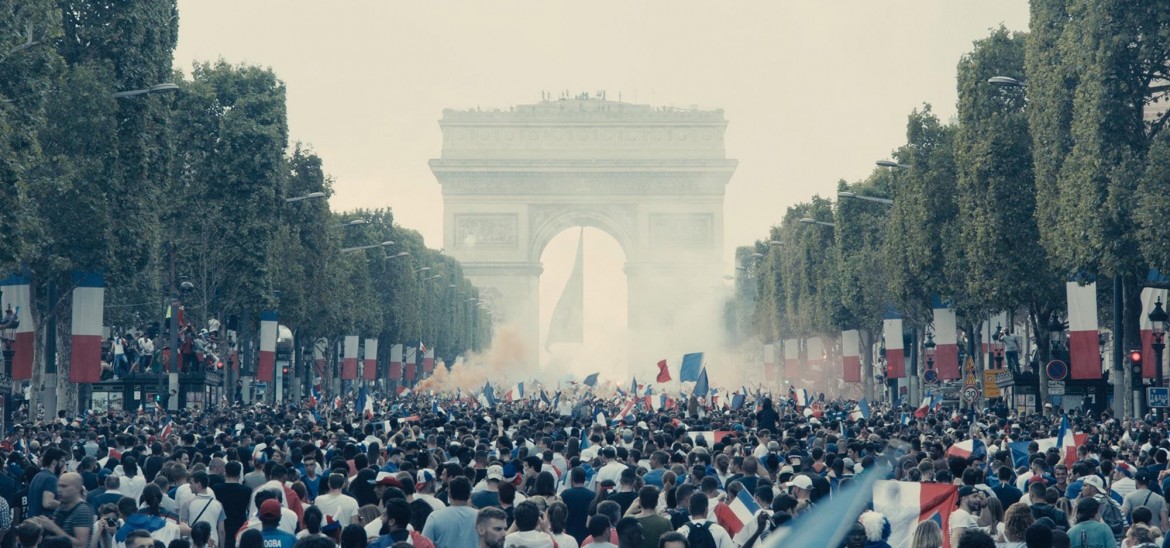Into Film Clubs
Find out everything you need to know about starting an Into Film Club.



Inspired by the 2005 Paris riots but set in the aftermath of France's 2018 World Cup victory in men's football, Les Misérables is an energetic thriller, based on director Ladj Ly's own short film of the same name, which tells the story of a community's youth clashing with the local police.
Les Misérables follows three police officers - Stéphane, Chris and Gwada - who work in the Anti-Crime Squad in the suburbs of Paris, home to a diverse community of ethnic backgrounds and also an area of economic deprivation, where the director grew up. Stéphane is a new recruit to the unit and it's through his eyes that the audience sees the story. He quickly becomes aware of the existing tensions between law enforcement and local youth gangs, but also of the aggressive, provocative and often violent nature of his two colleagues, particularly the group's leader, Chris.
When events begin to escalate and the trio are caught in an explosive confrontation that leads to a violent arrest - all of which is captured on camera by an overhead drone - his partners put pressure on him to toe the line regardless of the injustice he's witnessed. Despite the sinister sounding nature of these events, the film otherwise refuses to paint characters as heroes or villains, with Ladj Ly commenting that "there is bad and good on both sides. I try to film each character without judgement".
Though not a traditional adaptation of Victor Hugo's seminal novel, the shared name is clearly no coincidence. The events of this film take place in Montfermeil which is notably where Hugo's work is set, and there are other thematic commonalities, including tensions between law enforcement and citizens. Ladj Ly's film remains more of a comment on the novel and how so much of it still resonates today than a reworking of it, but the links are evident. He takes inspiration from elsewhere too, including the real-life 2005 Paris riots, while also incorporating the excitement and euphoria of France's World Cup triumph in the rest of the country and throughout the centre of the capital. But here, in Montfermeil on the outskirts, nothing has changed; everything remains just as it always has been, even back in the mid-19th century.
One aspect that makes Ladj Ly's film all too relevant is its portrayal of police brutality and its interrogation of injustice at the intersection of law enforcement and community behaviour. In this regard, it joins a chorus of youth-friendly titles from recent years which explore these issues and form a part of our Black Lives Matter theme page, most notably the likes of The Hate U Give and Monsters and Men, with all three titles embracing youth culture and modern technology to tell the story, either through mobile phone footage (as in the former titles) or, as in Les Misérables, cleverly incorporating the use of a drone as a key part of the plot.
It really helped me understand the perspective of the police but also the lack of understanding between the police and the people they deal with…
Into Film Young Reporter, Izzy
As well as having lived in this area of Paris while growing up, filmmaker Ladj Ly has a background in documentaries which really feeds into the tone and pace of this film; Les Misérables has a pulsating rhythm to it, full of energy, urgency and action. It is a film which feels authentic because of who is telling the story, and it provides a snapshot of those living in a side of Paris we rarely see on screen. In this regard it shares a kinship with other docu-drama and/or social realist films like The Class and Girlhood, titles which represent a range of experiences in their characters which from a multitude of backgrounds to create a microcosm of modern, multicultural France.
Another key influence on this title is La Haine, the black-and-white crime drama from 1995 which is about 24 hours in the lives of three young men in the immediate aftermath of a suburban riot. La Haine itself receives a timely re-release from the BFI in a 4K restoration next week (11 September), ready for a new generation to experience this all-too-relevant, timeless classic while discovering its spiritual successor in Ladj Ly's Les Misérables alongside it.
These films all have a particular attachment to a setting - a real sense of time and place about them - and therefore this new Les Misérables also evokes other titles which have this connection beyond the Parisian suburbs, such as '71 and Spike Lee's Do the Right Thing. Be it war-torn Belfast or a heatwave-stricken Brooklyn, these films share a sense of energy, urgency, anger and violence that inevitably boils over into chaos, and they too exist on the precipice between authority, law enforcement and civil unrest.
Les Misérables joins a chorus of titles which interrogate issues around race, class, citizenship and authority, emerging as a critical film to continue discussion and debate around these subjects for young audiences through its energetic, urgent filmmaking which carries a weight of authenticity behind it.
Les Misérables is released in UK and Irish cinemas from 4 September. Visit miserables.film for more information.
Viewing 4 of 4 related items.

Find out more about our streaming service, designed specifically for UK schools.